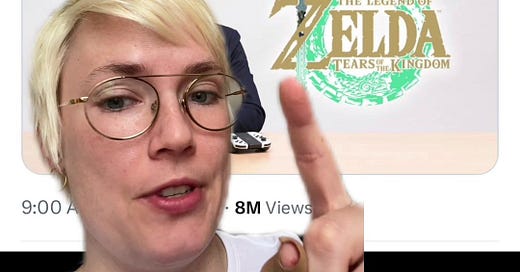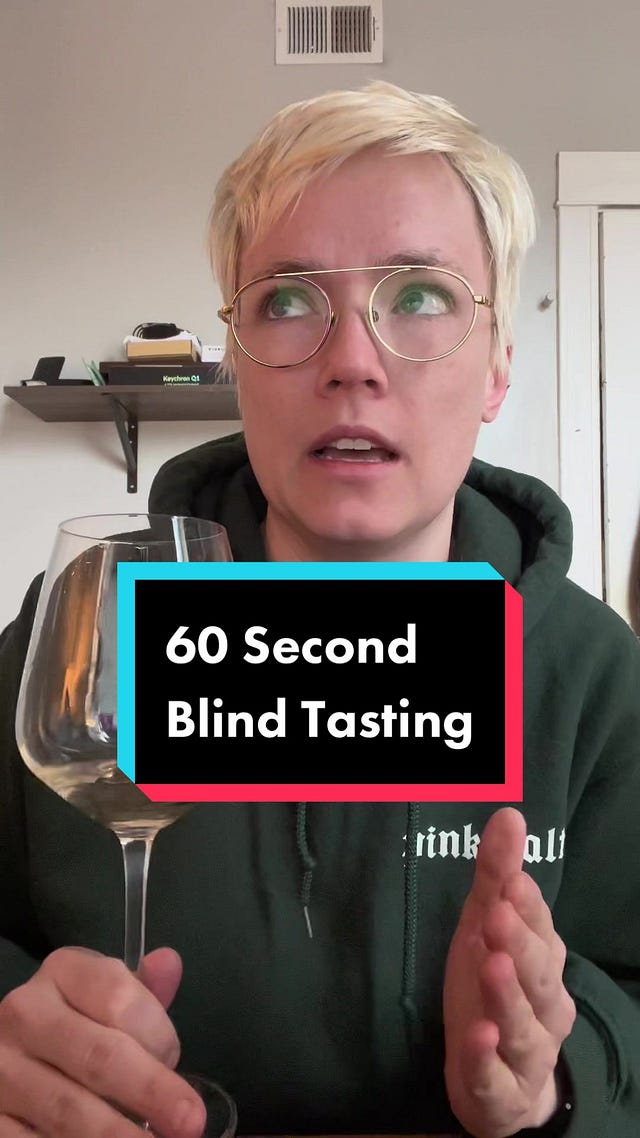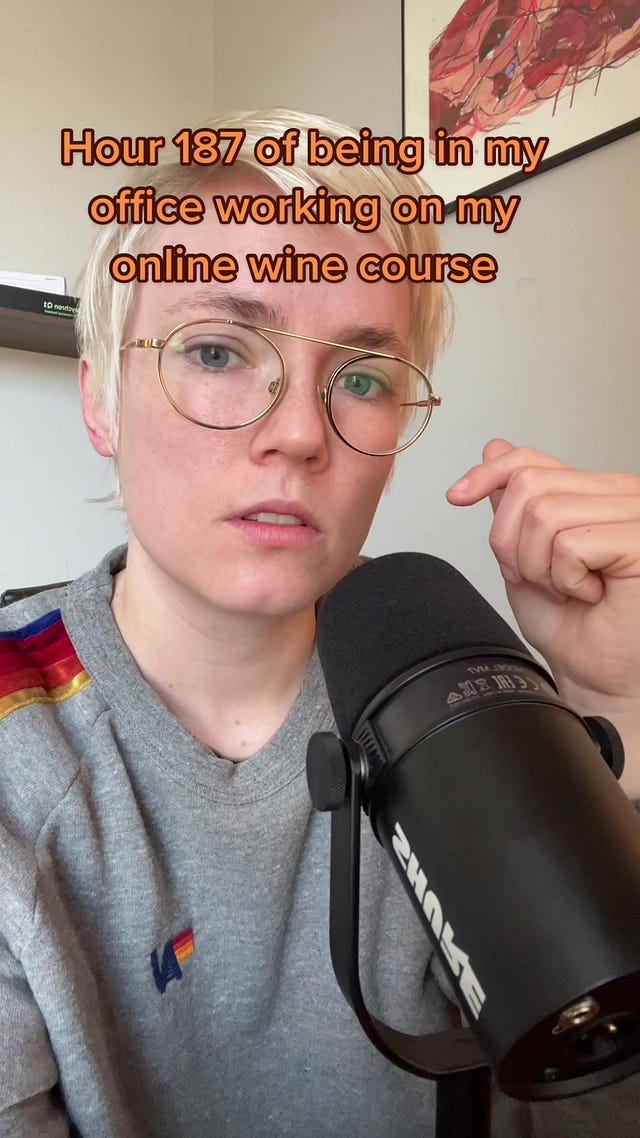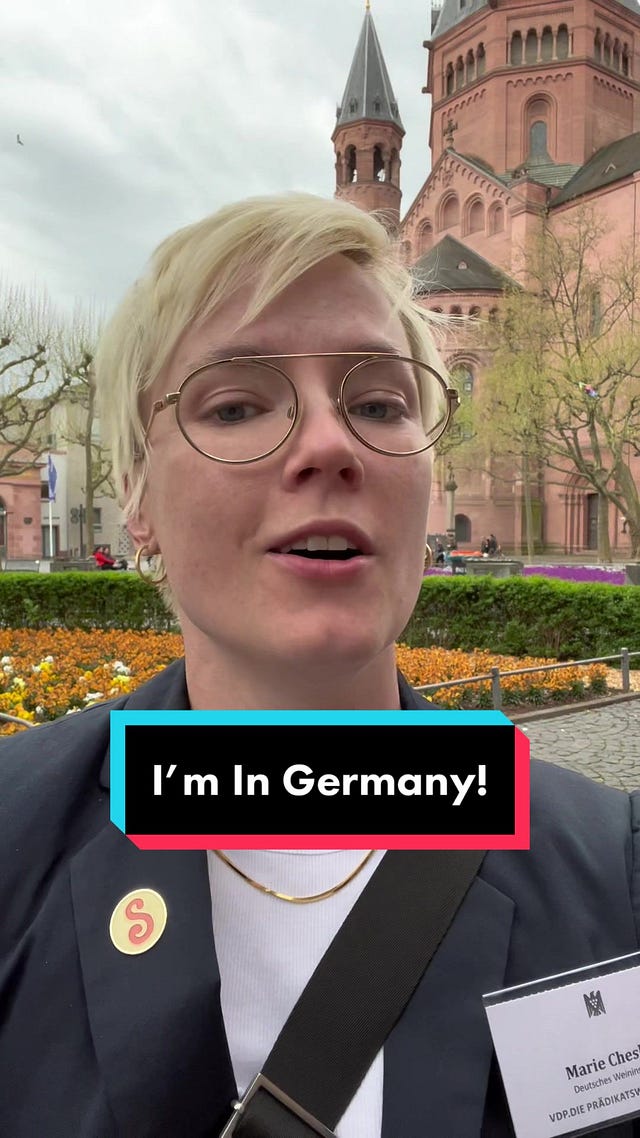On Learning About Wine, Part II
A continuation of our interview with Marie Cheslik of Slik Wines!
In case you missed part one of this incredible chat, check it out here. For anyone new (Hi! Thanks for being here!), a refresher: I first met Marie at BottlesUp, and I knew the moment she started teaching that this person was someone I wanted to follow. Approachable is a word that gets thrown around a lot in wine, and it’s rarely used honestly. But for Marie, who has developed a cult following on social media, approachable and fun are at the core of everything she does through Slik.
The first part of our conversation focused on Marie’s upcoming wine course, which you can learn more about by signing up for her newsletter. Later in our chat, we got into the weeds about education, and I wanted to share that part of our conversation as well.
This conversation has been condensed and edited for clarity.
Laura Scherb: I feel so lucky to be watching what you’re doing because it just —well, I know it might feel different from the inside versus from the outside, and I'm sure it feels very different for you on some days — but it just looks like you are so flexible and thinking about your consumer and grabbing what they want by the horns and just doing your thing. And it's amazing.
Marie Cheslik: Yeah, well, thank you. I mean, I’m just listening to the consumer who I affectionately call the Slik Squad, right? That's so much of what makes this work. Like, I can't just put things out there that people don't want. That doesn't make any sense.
I just did a little TikTok about this yesterday, but I like video games. It's my form of escapism, you know? Some people read; some people do whatever; I like playing video games. And so our video game fans out there, this is for you. But I think about Nintendo, who does the Mario series and the Zelda series. And there's three big components that they do that I really admire, and I think attribute to their massive success. I'll go through them quickly.
Number one is taking the time to make a good product. Like, sometimes they take years to release the next game. And they're like, “We don't care. We know we're working on something really good. And it's for you. So, like, every day we work on it, it's gonna get better for you.” And that's what I feel like I'm doing with the course right now. I could just release it and have it be evergreen, meaning you could buy it all the time. But that's not what needs to happen. I need more feedback. I need to see what people think. Much like Nintendo does. Nintendo gets feedback from people to see that this is what they liked. This is what they don't like.
And this sounds silly. But I think the real key portion to this is actually doing something about the feedback. Because I know people collect feedback. I know people in giant corporations who collect feedback, and don't do anything about it. And it's like, what was the point of collecting all this feedback from people if you're not actually going to listen to it and do something about it? Right? But that's what Nintendo does. They're just like, “Fuck it, now it's going to be part of our” — can I swear on this? I'm sorry.
LS: Yeah, of course. Okay.
MC: Great. So yeah, they're just like, “We're just gonna make all these changes that you guys like. And that's going to be our next iteration of this game.” And that's why everyone loves them, because they actually care and they’re actually listening. And if I can be sort of the same way with Slik, getting my own ego out of the way, or getting out my own head of what I think something should be, and just having a leading idea. Like, “I was thinking this, this, and this,” and then people come back to me and say, “This is good, but I wanted more of this.” And then me saying, "Okay,” and then actually doing it. So it sounds simple. But it really doesn't happen as much as people think.
LS: Yeah. We all love to think that we’re the experts. And we’re not, at all. It’s whoever you're doing the thing for, which is a tough but good thing to remember.
MC: Yeah, I think there's something to be said for being expert in a product. Like, I know a lot about wine. But just because I know a lot about wine doesn't mean I know a lot about building a product or selling a product. Right? So I think there's nuances that need to be respected in this, and we're not as smart as we think we are. And we need to hear what other people have to say.
LS: Yes, yeah, totally, totally. And as a wine consumer who, again, has taken some womp-womp classes that I paid a significant amount of money for…I don't know, they're… it's a bookmark on my computer. I'm looking at right now. And it would take a lot of arm twisting for me to go back to here.
MC: Let me ask you this. So you said earlier, this course that you're taking feels womp-womp? Because it's not very fun, or it's not very engaging?
LS: Yeah.
MC: What else? What is it to you about this course that could be better? And if you were to make the course your way, what would you do?
LS: I mean, it just feels like a very high-level sort of approach. I think that she has it set up this way intentionally, right? She says that you can take — I'm totally going to butcher the name — but some acronym-named test after you complete the course. And you could be expected to succeed at that test after taking this. That's great. But, like, I'm not going to do that.
MC: 100%.
LS: I just want to know that when I go out to dinner with my friends, who god bless them, don't know a thing about wine, that the bottle that we get as a table is one that I'm going to enjoy, right? Like I'm coming at this from a totally selfish perspective.
MC: Yeah. 100%. Yeah.
LS: So I was thinking about education and learning. And it's sort of a very different framework, but I feel like it applies here too. So last year, when we went to Italy, I did Duolingo for months beforehand. And then I got there. And I was like, I don't know how to say anything, except for “The dog reads the newspaper.” And that is just not a sentence that I would ever use. So, I stumbled upon this podcast recently. And it just comes at language differently. Alright, unit one: How do you say who you are? How do you say where you're from? How do you ask someone else's name? Unit 2: You're in a restaurant. How do you order? And it just felt like I'm learning the same amount of words and grammar, but I'm learning it in a way that just makes so much more sense for what my end goal is.
And I think that that was my issue with this course. It just felt like Duolingo where I was like, alright, now I know how to say the dog reads the newspaper, but is this actually gonna get me to a bottle of wine that I enjoy? I don't know.
MC: Absolutely. I think that's a great comparison too with Duolingo. Because I felt that same way too. And there's a YouTuber, his name is XiaoMa. He's a white guy. He's from New York, but he lived in Beijing for years. And he's a polyglot.
But he does a course that's way more practical, right? And he makes that same argument. He says that Duolingo teaches you blocks, and when you put the blocks together, they don't make any sense, right? Instead, he teaches you how he learned himself. Like, yes, you need to know some verbs. Yes, you need to know some nouns, but I'm gonna help you structure your sentences, and I'm gonna help you structure them in a way where it's going to be help you get to the train station, order something in a restaurant, trying to get a hotel room, or asking someone where they're from and what they do for work, like more common conversations and practical conversations you're gonna have with people when you're traveling.
LS: Yeah, it's just, like, it's a totally different mentality, I think, when you're approaching it. And also the instructor for this particular course was just not someone I thought was super interesting or even had personality at all. And, for me, I think that's why having Melissa Zeman (of BottlesUp) as an intro to the wine space, like she knows so many people with personalities and an interest and a passion and an opinion, even, and that's what draws me to people or their products. And this person just doesn't have that.
MC: Yeah, and I think I think that's interesting too, because in some ways, you're almost asking for a polarizing opinion.
LS: Yeah.
MC: You know, yeah, like James Suckling, who is a wine critic for Wine Spectator, big deal guy. He's polarizing in a certain way too, you know, like, old white guy teaching about wine to Gen Xers, right?
And having someone more, I would say, “neutral” or more encompassing of a larger demographic, I think, in theory sounds like what people want, like, “Oh, you're getting a wider swath of people! Oh, you're getting more people interested in your products!” But I've learned over time: it's way better to niche down and specialize. Like, yeah, I mean, me, Marie Cheslik, Slik Wines, I'm probably never gonna get this James Suckling clientele. And you know what, that’s fine. Because that only means I'm doubling down on people like you, who are like, “I really feel seen by you. And the language you're using really makes me feel like you're going to help me.” And to me, that's way more important, and eventually from a business side will probably make more money down the road. Because these people will stick with me longer too, like, “I love this product. What's next? I love what you're doing. What's next. I love your Instagram page. Can I book a class with you?”
Right? 80% of the of the forms I get to do a private tasting come from social media. And that's not a coincidence. People will respond to you better if you really use the marketing, quote, unquote, marketing — like I am just who I am. But that is marketing, right? I talk a certain way, I'm from a certain place, things like that. Like it's better to be polarizing almost in some way than to be sort of neutral. Like the person teaching this course. Right? It's like, yeah, it's kind of for everyone. But when you say, “Hey, everyone buy my product!” it's just, it's harder as opposed to like, “You're a Midwestern gal trying to order wine in a restaurant, and I've been there, I'm here to help you.” It’s like, damn. You get that I’m talking to you. Awesome.
LS: Exactly. Exactly. Yeah. You hit the nail on the head. And I'm excited to take your course having tried to take that one and completely just like, you know, have it be an empty bookmark on my desktop.
Is there anything else that you want to add about the course or your book or anything?
MC: That's my life right now, baby. Follow me on Instagram. You know, the old Instagram/TikTok machine, YouTube. I'm also an ambassador for Wines of Germany this year. So what that really means is that I preach the good word of German wines, which is great, because I already loved German wines, even before they reached out to me. So it was a very genuine, easy fit for me.
But yeah, I'll be going to Germany at the end of April. So if you want to come hang out and see what that's like, I'll be filming everything just like I always do. Then, I will be in Texas. So if you like wine, if you like travels, if you like stupid TikToks, follow Slik Wines.
LS: Awesome. Cool. Well, thank you so much for the time. I'm so excited to sit down and transcribe this and get it out there.
MC: Thanks for hanging out. Thanks for having me. And I'll see you out there in the world. Or on the internet!
LS: Both probably!
Learn more about Marie’s course here.
Coming soon to a newsletter near you: cookbook reviews! Interviews with CPG founders and developers working on a new cooking-focused app. More recipes! A photo essay about a place that means a lot to me. We’re getting personal, people! Don’t miss it.








